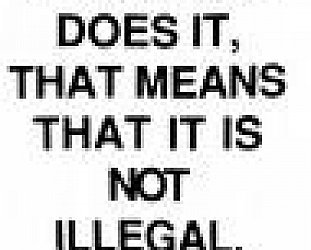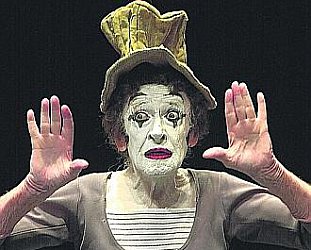Graham Reid | | 11 min read

The cover of New York's weekly Village Voice in early June encapsulated the feeling in a single image. It was a variation on Grant Wood's famous painting American Gothic, the portrait of the elderly, pitchfork-bearing Iowan farmer and his spinster daughter. But rather than representing the Puritan ethics and hard-working dignity of the Midwest as Wood's 1930 painting intended, in the Voice adaptation their eyes were glancing about fearfully.
The heading for the related articles was "Paranoid Nation: Bush's lies spawn an age of doubt"
During two months travelling from California to Georgia, and time in New York and San Francisco, I couldn't help observe Americans being scared into fear and uncertainty. The Voice essays - subtitled "From Nicholas Berg to Abu Ghraib, the search for something to trust" - simply confirmed the creepy feeling.
With the announcement this week by homeland security chief Tom Ridge of a possible al Qaeda attack on specific targets in New York, Newark and Washington DC the fear factor was hiked up yet again. But so was the cynicism; Americans have heard this all before.
Former Democratic presidential candidate Howard Dean perhaps spoke for many when he noted that in the absence of specific information available to the public it was hard for people to know what to think.
"I am concerned that every time something happens that's not good for President Bush he plays this trump card which is terrorism," Dean told CNN. "His whole campaign is based on the notion that 'I can keep you safe therefore at times of difficulty for America, stick with me' - and then out comes Tom Ridge."
For many Americans of all political persuasions Ridge is sounding like the boy who cried wolf. In May he weighed in with a vague warning of a terrorist attack being imminent and many noted with cynicism this announcement came after Bush had again fallen in the polls, and that the alert status remained unchanged. America feels like a country being driven into a perpetual, Orwellian position of vigilance and alarm.
But it isn't just tetchy politics creating this climate of fear and uncertainty - popular culture is infected by insinuating paranoia.
The bestseller in truckstops, bookstores and on people's lunch tables is Dan Brown's novel The DaVinci Code. Its source is the pseudo-history Holy Blood, Holy Grail published more than a decade ago and which was a purported investigation of the Knights Templar, French secret societies, the Rosicrucians and Nazis.
It matters little that the earlier book was widely discredited: Brown's even more fictional version - a murder-thriller lacquered in faux-history - is being taken seriously in some quarters. It spawned a popular spinoff pseudo-documentary.
Otherwise sensible people are persuading themselves there is so much they don't know about the way governments and oddball secret organisations work that they must be in cahoots, that the New World Order is coming, that the furtive Catholic organisation Opus Dei is controlling governments ...
Unseen enemies are everywhere.
Alex Jones - a kind of feral Michael Moore - has a popular website, www.infowars.com, which argues that America is rapidly becoming a police state (the Patriot Act only the beginning), and the Bush administration knew about the impending al Qaeda attacks in 2001 but did nothing, to gain political supremacy at home and abroad.
These kinds of assertions are perhaps not unexpected in a nation that has still not resolved the assassination of its most popular president. But it is also symptomatic of a bigger picture of suspicion and uncertainty.
America is a land besieged from without and within. Hollywood is framing this as a time of confusion, when you've got to watch your back, your elected officials and even the weather.
The Day After Tomorrow, an artlessly silly B-grade disaster flick, was used as the starting point for superficially serious discussions about global warming everywhere from newstalk television to apocalyptic religious programmes. In the movie the ice-caps melt and the world - or more correctly, New York because that is about all we see of the world - is thrown into an overnight ice age. Nature itself is conspiring against America.
Critics, almost without exception, noted the resemblance between the do-nothing vice-president in the film and Dick Cheney. The anti-Bush website MoveOn.org called it "The Movie the White House Doesn't Want You To See".
This is untrue of course, but the blazing headline illustrates how politicised, partisan and paranoid America has become.
Even former Vice-President Al Gore - a mild-mannered man who many believe had his personality removed shortly after birth but who has re-appeared as a born-again, bellicose politician mounting attacks on the Bush Government - said he considered the film "extremely enjoyable and exciting - beyond the message".
There was a message?
Then I, Robot arrived. Set in an imaginary near-future when robots rise up against humans, it makes you look twice at your automated world.
Now there is the remake of John Frankenheimer's Cold War classic, the political thriller The Manchurian Candidate. It comes with the chilly slogan, "Everything is under control ... " and is set against the backdrop of suicide bombers in a security-conscious America.
Released in the States last week it has a subtext of corporate influence on the White House. The film's producer Tina Sinatra - youngest daughter of Frank, who starred in the original film - acknowledges the shady Manchurian Global corporation in the new version has some similarities with the Carlyle Group and Halliburton, with whom senior Republicans have close connections. Another case of the enemy within.
Sinatra remembers her father sending the family out of town after the assassination of president John Kennedy, a year after the original film's release.
"I remember that paranoia and fear," she told the Village Voice. "So I think this film, at a substantially different level, is affecting people in the same way at test screenings. I've seen that youth are frightened; there is a reason to worry. Maybe it's too timely."
As LA Weekly reviewer John Powers notes: "Because we already live in an era of nonstop political paranoia and conspiracy mongering, fiction must struggle to equal, let alone outstrip, reality."
In a nation that frequently, often desperately, elevates ordinary people to iconic status with unquestioning enthusiasm, even heroes are being revealed to have feet of clay.
In the new film The Alamo John Wayne's tight-lipped and fearless Davy Crockett of yesteryear has been supplanted by Billy Bob Thornton's portrayal of Crockett as a reluctant fighter who probably wouldn't have been at the old mission if he'd got wind of what a slaughter it was going to be. The Alamo occupants bicker among themselves as the Mexicans surround them. Heroes?
They are even hard to find in real life.
The image of jut-jawed football player Pat Tillman - characterised as a kind of moral superman who quit a lucrative playing career to join the military, only to die in Afghanistan - was seen everywhere for a week. He was hailed as a modern American hero, or at least was held up as one by the Fox network and the military while the Iraq prisoner mistreatment crisis was blowing up big.

When it was learned he had been killed by "friendly fire" - and many bar-room patriots discovered the difference between Afghanistan and Iraq - the headline story became tarnished and faded quietly into inside pages.
The beheading of Nick Berg proved even more problematic. Rather than an event that galvanised a nation's spirit, doubts were immediately cast. Suspicion was endemic.
"Jesus, you gotta wonder about a guy who goes into a war zone like that and seems to just wander around looking for business," said John-Michel from Lafayette over martinis.
He encapsulated the concerns many have, and the widespread mistrust about news coverage. And news just keeps happening, most stories disappearing beneath the impact of a new one, or the weight of over-analysis. In rapid succession came gay marriages, a new crisis in Iraq, petrol prices, Pat Tillman, inmate abuses in Iraq, Nick Berg, Michael Jackson, assassinations in Iraq, petrol prices again ... Few of these lasted more than a day or two as headlines. As in the Berg case, the more you learned the less you knew.
Political reporting suffers from a curious conjunction of too little information and too much analysis.
During the war in Vietnam a famous anti-war poem had as its repeated refrain, "a spokesman said" to underscore how much information - and disinformation - came from unattributed sources. Things have changed. Now spin-doctors and experts (usually with conflicting interpretations) clutter up nightly newstalk television. There are interviews with former and current military figures, strategists, political scientists, lawyers representing those facing prisoner abuse charges, military personnel, senators, journalists - and just about anyone in a suit with an opinion. The "spokesman" can barely get a word in above the chatter.
Conspicuously absent are the two figures you might most expect to be there: Bush and Kerry.
While our Prime Minister can be found everywhere from student radio to Holmes and the leaders of the Opposition and sundry other minnow parties have their hands up like keen schoolchildren, Bush and Kerry appear as stolen images. It was hardly surprising most Americans didn't know much about Kerry until the Democratic convention. Before that he was most often seen shaking hands or behind a podium (although the media voice-over drowned out what he was saying). On television Bush was usually walking to or from a helicopter. Then on came experts and interpreters to fill the screentime.
In the absence of the heavyweight protagonists, the struggle for hearts, minds and votes is being fought through advertising campaigns, most of which are laughably transparent in their appeal but negative in character.
Their shallowness and simplistic nature is so easy to measure it was inevitable someone would. So USA Today did, analysing the tone and content of these soundbites.
The breakdown showed the Bush campaign led in negative advertisements and had spent two-thirds of its budget on them. Nearly half the statements were attacks on Kerry, compared with 19 per cent of Kerry's being attacks on Bush.
But Kerry is getting help from factions such as The Media Fund, MoveOn.org Voter Fund and others, which are spending around US$30 million (NZ$48 million) on anti-Bush ads.
Which means dollar-for-dollar - the Bush re-election campaign having spent US$70.5 million ($112 million) and the Kerry campaign US$44.5 million ($71 million), so far - both sides are shelling out about the same to do the other guy down.
This negative campaigning - fear mongering, in fact - coupled with an atmosphere of discomfort means uncertainty is pervasive.
Ironically, the network that would best serve this administration, the jingoistic Fox channel, which has reduced global politics to an "Us" - or more correctly "US" - and "Them" divide, is unwittingly feeding this sense of a beleaguered nation under siege.
For a brief period Bush had the advantage of some set piece speeches - at the D-Day commemorations and Ronald Reagan's funeral - which afforded him the opportunity to appear statesmanlike. They were godsends for a president sinking rapidly in the polls and allowed him - courtesy of some astute speech writing - to recall heroes of the past, link his presidency with lofty notions such as saving the free world, and recall a Republican heyday.
But even oldtime Republicans noted the Reagan funeral had been turned into an overwrought and over-long circus of cheap sentiment masquerading as patriotism and emotion. In the LA Weekly Steven Mikulan referred to the weeklong rites as "nothing less than a funeral festival, part Bayreuth, part P. T. Barnum".
Flags lowered to half-mast on Government buildings for a full month, at the President's orders, seemed excessively milking the occasion. Scepticism has morphed into cynicism, and it is everywhere.
Bookshops are stacked with titles such as American Dynasty: Aristocracy, Fortune and the Politics of Deceit in the House of Bush and A Culture of Conspiracy: Apocalyptic Visions in Contemporary America.
Doubts and fears are widespread. At a Miami bar one night after a lengthy political discussion I tried to make light of them.
"Anyway," I said, buying the next round, "just because you are paranoid, doesn't mean they aren't out to get you."
My companions didn't laugh. Not a lot of Americans do right now.







post a comment